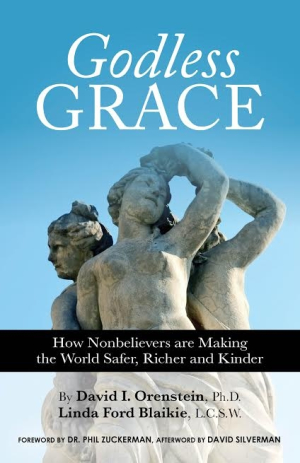Godless Grace
How Nonbelievers Are Making the World a Safer, Kinder Place
Interviews with dozens of prominent humanitarian atheists underscore the belief that humans are hardwired for kindness.
Americans are much more likely to vote for a convicted felon than an atheist, according to a recent sociology study, on the basis that nonbelievers do not share the voters’ morals or beliefs. Two scholars fight this prejudice with Godless Grace, placing the right to not believe as the next great civil-rights movement.
David Orenstein and Linda Ford Blaikie make a grand case by interviewing dozens of atheist humanitarians and secular activists who are making the world better simply for the sake of helping others and not to please a judging god or adhere to religious dogma. They speak with Hindus turned atheists who are working to rehabilitate temple prostitutes, former Jews who are barricading bulldozers in Palestine, and ex-Catholics fighting the illegal imprisonment of accused “witches” in Africa. They profile a young humanist who started the Pathfinders Project, in which secular activists work side by side with religious groups to build latrines in Haiti and work for environmental conservation in Africa. Another featured atheist created the Foundation Beyond Belief as a philanthropic channel for nonbelievers to donate continuously as an expression of their worldview.
Through the interviews, subjects reveal how they began on the path toward nonbelief, any ill effects on their lives or families, and what motivates them to do good work. Presented as a collection, the interviews underscore that many of the secular activists share a belief that humans are hardwired for kindness and not for original sin. Many also hold “love thy neighbor” as the end goal, not a way into heaven.
Godless Grace includes a brief history of atheism and demographics of the new atheist movement, but the interviews showing that the faithless can indeed have strong ethics compose by far the most compelling section. In the end, Orenstein and Blaikie make a case that “grace can and does come from the godless” and that “theological guidance is not essential for empathy, altruism, meaning or love.” It may compel nonbelievers to reflect on what exactly motivates their deeds and actions in the absence of a God: to be good for goodness’s sake.
Reviewed by
Amanda McCorquodale
Disclosure: This article is not an endorsement, but a review. The publisher of this book provided free copies of the book to have their book reviewed by a professional reviewer. No fee was paid by the publisher for this review. Foreword Reviews only recommends books that we love. Foreword Magazine, Inc. is disclosing this in accordance with the Federal Trade Commission’s 16 CFR, Part 255.

